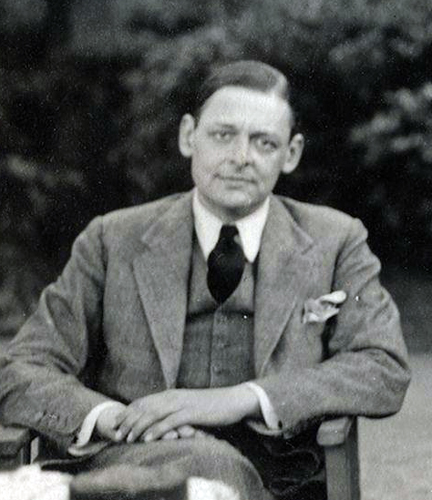Obras
The Sacred Wood
Thomas Stearns EliotThomas Stearns Eliot Frases famosas
“Só os que se arriscam a ir longe demais são capazes de descobrir o quão longe se pode ir.”
Only those who will risk going too far can possibly find out how far one can go
citado em "The Cornell hotel and restaurant administration quarterly", Volume 4 - Página 3, Cornell University. School of Hotel Administration - School of Hotel Administration, Cornell University., 1963
Thomas Stearns Eliot frases e citações
Immature poets imitate; mature poets steal; bad poets deface what they take, and good poets make it into something better, or at least something different.
citado em "Eliot, T.S., “Philip Massinger”, The Sacred Wood".
“O que poderia ter sido e o que foi convergem para um só fim, que é sempre presente.”
What might have been and what has been. Point to one end, which is always present
Prufrock and Other Observations and THE DIARIES OF FORTUNE - página 30 http://books.google.com/books?id=A8KxC8oMgN4C&pg=PT30, T. S. Eliot and Daniel Oldis, KayDreams, ISBN 1603038345, 9781603038348
the poem, which is a process of exploration, an effort to circle the object which is its focus, and return to the starting point with a fuller comprehension of it
citado em "T. S. Eliot: poems in the making" - Página 185, Gertrude Patterson - Manchester University Press, 1971, ISBN 038904086X, 9780389040866 - 198 páginas
The Use of Poetry and the Use of Criticism
Thomas Stearns Eliot: Frases em inglês
“Only those who will risk going too far can possibly find out how far one can go.”
Preface to Transit of Venus: Poems by Harry Crosby (1931)
“Where is the wisdom we have lost in knowledge?
Where is the knowledge we have lost in infomation?”
Choruses from The Rock (1934)
Variante: Where is the Life we have lost in living?
Where is the wisdom we have lost in knowledge?
Where is the knowledge we have lost in information?
Contexto: O perpetual revolution of configured stars,
O perpetual recurrence of determined seasons,
O world of spring and autumn, birth and dying!
The endless cycle of idea and action,
Endless invention, endless experiment,
Brings knowledge of motion, but not of stillness;
Knowledge of speech, but not of silence;
Knowledge of words, and ignorance of The Word.
All our knowledge brings us nearer to our ignorance,
All our ignorance brings us nearer to death,
But nearness to death no nearer to God.
Where is the Life we have lost in living?
Where is the wisdom we have lost in knowledge?
Where is the knowledge we have lost in information?
The cycles of Heaven in twenty centuries
Brings us farther from God and nearer to the Dust.
Variante: Between the desire
And the spasm
Between the potency
And the existence
Between the essence
And the descent
Falls the Shadow
Fonte: The Hollow Men (1925)
“For last year's words belong to last year's language
And next year's words await another voice.”
Variante: For last year's words belong to last year's language
And next year's words await another voice.
And to make an end is to make a beginning."
()
Fonte: Four Quartets

Fonte: The Use of Poetry and the Use of Criticism
The Love Song of J. Alfred Prufrock (1915)
Contexto: Do I dare
Disturb the universe?
In a minute there is time
For decisions and revisions which a minute will reverse.
For I have known them all already, known them all: —
Have known the evenings, mornings, afternoons,
I have measured out my life with coffee spoons;
I know the voices dying with a dying fall
Beneath the music from a farther room.
“Unreal friendship may turn to real
But real friendship, once ended, cannot be mended”
Fonte: Murder in the Cathedral
“Speech without word and
Word of no speech
Grace to the Mother
For the Garden
Where all love ends.”
Ash-Wednesday (1930)
Contexto: Lady of silences
Calm and distressed
Torn and most whole
Rose of memory
Rose of forgetfulness
Exhausted and life-giving
Worried reposeful
The single Rose
Is now the Garden
Where all loves end
Terminate torment
Of love unsatisfied
The greater torment
Of love satisfied
End of the endless
Journey to no end
Conclusion of all that
Is inconclusible
Speech without word and
Word of no speech
Grace to the Mother
For the Garden
Where all love ends.
Tradition and the Individual Talent (1919)
Contexto: The historical sense involves a perception, not only of the pastness of the past, but of its presence; the historical sense compels a man to write not merely with his own generation in his bones, but with a feeling that the whole of the literature of Europe from Homer and within it the whole of the literature of his own country has a simultaneous existence and composes a simultaneous order. This historical sense, which is a sense of the timeless as well as of the temporal and of the timeless and of the temporal together, is what makes a writer traditional. And it is at the same time what makes a writer most acutely conscious of his place in time, of his contemporaneity.
Tradition and the Individual Talent (1919)
Contexto: What happens when a new work of art is created, is something that happens simultaneously to all the works of art which preceded it. The existing monuments form an ideal order among themselves, which is modified by the introduction of the new (the really new) work of art among them. The existing order is complete before the new work arrives; for order to persist after the supervention of novelty, the whole existing order must be, if ever so slightly, altered; and so the relations, proportions, values of each work of art toward the whole are readjusted; and this is conformity between the old and the new.
Tradition and the Individual Talent (1919)
Fonte: Selected Essays
Tradition and the Individual Talent (1919)
Contexto: The bad poet is usually unconscious where he ought to be conscious, and conscious where he ought to be unconscious. Both errors tend to make him "personal." Poetry is not a turning loose of emotion, but an escape from emotion; it is not the expression of personality, but an escape from personality. But, of course, only those who have personality and emotions know what it means to want to escape from these things.
Fonte: The Waste Land (1922), Line 359 et seq.
Eliot's note: Stimulated by Shackleton's Antarctic expedition where the explorers at the extremity of their strength believed there was another who walked with them across South Georgia!
The Ad-dressing of Cats
Old Possum's Book of Practical Cats (1939)
Choruses from The Rock (1934)
